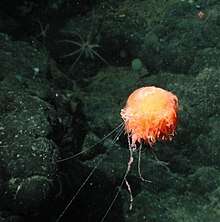Rhodaliidae
Rhodaliidae is a family of siphonophores. In Japanese they are called ヒノマルクラゲ (hinomarukurage).[5]
| Rhodaliidae | |
|---|---|
 | |
| Dromalia alexandri | |
| Scientific classification | |
| Kingdom: | Animalia |
| Phylum: | Cnidaria |
| Class: | Hydrozoa |
| Order: | Siphonophorae |
| Suborder: | Physonectae |
| Family: | Rhodaliidae Haeckel, 1888[1] |
| Type genus | |
| Rhodalia Haeckel, 1888 | |
| Genera and species | |
| |
| Synonyms[2] | |
Rhodaliids have a characteristic gas-secreting structure called aurophore.[2] Below the enlarged pneumatophore (float), the siphosome and nectosome are contracted into a complex.[2] Rhodaliids have a benthic lifestyle and use their tentacles to attach themselves to the seafloor.[2]
Genera and species
Rhodaliidae contains the following subtaxa:[2]
- Angelopsis Fewkes, 1886
- Angelopsis euryale Pugh, 1983
- Angelopsis globosa Fewkes, 1886
- Arancialia Hissmann, 2005
- Arancialia captonia Hissmann, 2005
- Archangelopsis Lens & van Riemsdijk, 1908
- Archangelopsis jagoa Hissmann, Schauer & Pugh, 1995
- Archangelopsis typica Lens & van Riemsdijk, 1908
- Dendrogramma Just, Kristensen & Olesen, 2014
- Dendrogramma enigmatica Just, Kristensen & Olesen, 2014
- Dromalia Bigelow, 1911
- Dromalia alexandri Bigelow, 1911
- Rhodalia Haeckel, 1888
- Rhodalia miranda Haeckel, 1888
- Steleophysema Moser, 1924
- Steleophysema aurophora Moser, 1924
- Stephalia Haeckel, 1888
- Thermopalia Pugh, 1983
- Thermopalia taraxaca Pugh, 1983
- Tridensa Hissmann, 2005
- Tridensa rotunda Hissmann, 2005
- Tridensa sulawensis Hissmann, 2005
gollark: I think it's squid's...
gollark: <@237328509234708481>'s AES.
gollark: I've gotten as far as converting the recipe dump to a multimap of item type to recipe, at least...
gollark: With parallelization it could be reduced to *one* hour!
gollark: Will anyone *notice* if computing their autocrafting job takes a few hours?
References
- Haeckel, E. (1888). Report on the Siphonophorae. Report on the Scientific Results of the Voyage of H.M.S. Challenger during the years 1873–76. Zoology. 28 (part 77): i-viii, 1-380, pl. 1-50., available online at http://www.19thcenturyscience.org/HMSC/HMSC-Reports/Zool-77/README.htm
- Schuchert, P. (2019). World Hydrozoa Database. Rhodaliidae Haeckel, 1888. Accessed through: World Register of Marine Species at: http://www.marinespecies.org/aphia.php?p=taxdetails&id=135350 on 2019-04-03
- Fewkes, J. W. 1886a. Report on the medusae collected by the U. S. F. C. Steamer Albatross, in the region of the Gulf Stream, in 1883-84. - United States Commission of Fish and Fisheries 12: 927-980, pls 1-10., available online at http://www.biodiversitylibrary.org/item/53809#page/1053/mode/1up page(s): 971
- Haeckel, E. (1888). System der Siphonophoren auf phylogenetischer Grundlage entworfen. Jenaische Zeitschrift für Naturwissenschaft. 22: 1-46., available online at http://www.biodiversitylibrary.org/item/43887#page/11/mode/1up page(s): 43
- Japan Agency for Marine-Earth Science and Technology. (2009 onwards). Biological Information System for Marine Life (BISMaL). Accessed on 2018-11-21. available online at http://www.godac.jamstec.go.jp/bismal
Further reading
- Pugh, P. R. (1983). Benthic Siphonophores: A Review of the Family Rhodaliidae (Siphonophora, Physonectae). Philosophical Transactions of the Royal Society B: Biological Sciences. 301(1105): 165-300. (look up in IMIS), available online at https://doi.org/10.1098/rstb.1983.0025
This article is issued from Wikipedia. The text is licensed under Creative Commons - Attribution - Sharealike. Additional terms may apply for the media files.